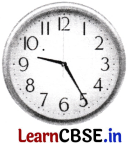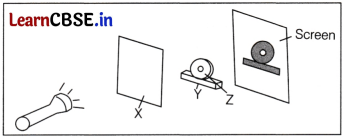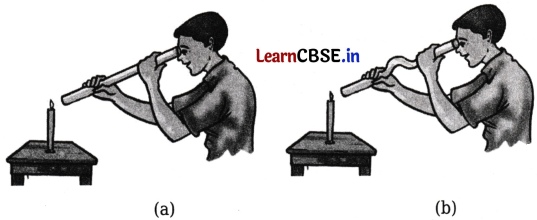Our subject specific Class 7 Science Curiosity Worksheet and Class 7 Science Chapter 11 Light Shadows and Reflections Worksheet with Answers Pdf are aligned with latest patterns.
Class 7 Science Chapter 11 Light Shadows and Reflections Worksheet
Class 7 Light Shadows and Reflections Worksheet
Worksheet On Light Shadows and Reflections Class 7 – Light Shadows and Reflections Worksheet Class 7
A. Objective Type Questions
Multiple Choice Questions
Question 1.
Which one of the following allows light to pass through it partially?
(a) Translucent
(b) Opaque
(c) Transparent
(d) All of the above
Answer:
(a) Translucent
Question 2.
In the case of reflection
(a) The virtual image is on the same side as the object
(b) The real image is on the other side of the reflector
(c) Both virtual and real images are on the same side as the object
(d) None of the above
Answer:
(b) The real image is on the other side of the reflector
![]()
Question 3.
Which of the following statements is correct?
(a) Plane mirrors are used in microscopes
(b) The image is inverted in a plane mirror
(c) The distance of the object from the mirror is equal to the distance of the image from the mirror
(d) If the object is 5 ft tall, the image in the plane mirror is 2\(\frac{1}{2}\) ft
Answer:
(c) The distance of the object from the mirror is equal to the distance of the image from the mirror
Question 4.
If we look at our image in the plane mirror
(a) Our right hand is the right hand of the image
(b) Our image is upside down
(c) Our left hand is the left hand of the image
(d) Our right hand is the left hand of the image
Answer:
(d) Our right hand is the left hand of the image
Question 5.
The image of the teeth seen by a dentist while testing the teeth is

(a) erect and real
(b) erect and virtual
(c) inverted and virtual
(d) inverted and real
Answer:
(b) erect and virtual
Question 6.
A plane mirror forms a virtual image. The distance between Maria and her image in a plane mirror is 10 m. How much distance should she move to get the distance of 5 m between herself and her image?
(a) 2.5 m away from the mirror
(b) 2.5 m towards the mirror
(c) 5 m away from the mirror
(d) 5 m towards the mirror
Answer:
(b) 2.5 m towards the mirror
Question 7.
The image, which is formed by a plane mirror, is due to the reflection of light. At which one of the following points are images of an object formed?
(a) Imaginary meeting point of reflected rays
(b) Imaginary meeting point of incidence rays
(c) At the meeting point of both the rays
(d) All of these
Answer:
(a) Imaginary meeting point of reflected rays
Question 8.
The image formed by a plane mirror is due to the reflection of light. Why is an image called virtual when it is formed by a plane mirror?
(a) It can be obtained on the screen
(b) It cannot be obtained on the screen
(c) Real image is formed
(d) All of these
Answer:
(b) It cannot be obtained on the screen
Question 9.
Sahil stood 3 m away from a plane mirror. He then moved 1 m away. Now, the distance between him and the image is
(a) 4 m
(b) 8 m
(c) 6 m
(d) 3 m
Answer:
(b) 8 m
Question 10.
Why is the word ‘AMBULANCE’ written right to left and inverted?

(a) To get everyone’s attention
(b) Because the ambulance driver can read it easily from his seat
(c) Because the drivers of the vehicle ahead see a laterally inverted image of the word ‘AMBULANCE’ in their rear-view mirrors
(d) None of the above
Answer:
(c) Because the drivers of the vehicle ahead see a laterally inverted image of the word ‘AMBULANCE’ in their rear-view mirrors
![]()
Question 11.
Consider the diagram below. A wall separated Ajit from a ball, but he was still able to see it.

Which one of the following shows how this was possible?




Answer:

Question 12.
Garima is studying the characteristics of the image formed by a plane mirror. Which of the following diagrams correctly shows the image of a plastic ruler in a plane mirror?




Answer:

Question 13.
The experiment in the diagram shows that

(a) Light rays are very thin
(b) A beam of light is made up of lots of light rays
(c) Light rays travel in straight lines
(d) The eye can only see in a straight line
Answer:
(c) Light rays travel in straight lines
Question 14.
A toy containing inclined plane mirrors. Which produces multiple reflections and creates beautiful patterns? Identify the name of the toy.
(a) Telescope
(b) Kaleidoscope
(c) Microscope
(d) Periscope
Answer:
(b) Kaleidoscope
Fill in the Blanks
Question 1.
Fill in the blanks by rearranging the words given with each sentence.
(a) Light is a form of _____________ [rnegye].
Answer:
Energy
(b) A _____________ [noumiunlson] object does not give out its light.
Answer:
Non-luminous
(c) Any polished or shining surface acts as a _____________ [iromrr]
Answer:
Mirror
(d) The image formed by the _____________ [lnaep] mirror is erect, virtual, and of the same size as that of the object.
Answer:
Plane
(e) Reflection is one of the _____________ [noemenophn] of light.
Answer:
Phenomenon
![]()
(f) _____________ [turialv] images cannot be caught on the screen.
Answer:
Virtual
Question 2.
Complete the blanks by choosing the appropriate words from the box given below.
(a) The _____________ [Sun/Moon] is a luminous object.
Answer:
Sun
(b) After striking the mirror, the ray of light is _____________ [incident/reflected] in another direction.
Answer:
Reflected
(c) _____________ (Virtual/Real) images are always formed by plane mirrors.
Answer:
Virtual
(d) The images formed by a test mirror are virtual, erect, and of the same size as the object. It must be a _____________ (plane/convex) mirror.
Answer:
Plane
(e) If you touch your left ear with your right hand in front of a plane mirror, it will be seen in the mirror that your right ear is touched with _____________ (right/left) hand.
Answer:
left
True/False
Question 1.
Write the Serial No. of the given statements in the appropriate boxes.

(a) The moon is a luminous object, giving out its light.
(b) An object can be seen only if it emits light.
(c) Light rays always travel in a straight line.
(d) Light sometimes travels in a straight line, and sometimes it follows a curved path.
(e) A virtual image is always erect.
Answer:
(a) False
(b) False
(c) True
(d) False
(e) True
Question 2.
Write ‘T’ for True and ‘F’ for False for the following statements.
(a) The size of a shadow depends on the distance between the object and the light source.
(b) A reflected light from a plane mirror can’t be reflected again.
(c) A plane mirror always forms a real and inverted image.
(d) In a plane mirror, left appears as right and right as left.
(e) A kaleidoscope consists of curved lenses.
Answer:
(a) T
(b) F
(c) F
(d) T
(e) F
Match the Following
Question 1.
Match the statements given in Column I with Column II.
| Column I | Column II |
| (a) Jugnu | (i) Reflects the light |
| (b) Light | (ii) Forms an image of the object |
| (c) Mirror | (iii) Travels in a straight line |
| (d) Pinhole Camera | (iv) Non-luminous |
| (e) Moon | (v) A luminous source |
Answer:
| Column I | Column II |
| (a) Jugnu | (v) A luminous source |
| (b) Light | (iii) Travels in a straight line |
| (c) Mirror | (i) Reflects the light |
| (d) Pinhole Camera | (ii) Forms an image of the object |
| (e) Moon | (iv) Non-luminous |
Assertion-Reason Questions
The questions given below consist of an Assertion and a Reason. Based on that, choose the appropriate option.
(a) Both Assertion and Reason are true, and Reason is the correct explanation of Assertion.
(b) Both Assertion and Reason are true, but Reason is not the correct explanation of Assertion.
(c) The assertion is true, but the Reason is false.
(d) The assertion is false, but the Reason is true.
Question 1.
Assertion: Shadows are formed only when an opaque object obstructs the path of light.
Reason: Opaque objects allow light to pass through them.
Answer:
(c) A is true, but R is false.
An opaque object does not allow any light to pass through it.
Question 2.
Assertion: The image formed by the plane mirror is erect.
Reason: The image formed in the plane mirror when the object is placed in front of the mirror.
Answer:
(b) Both Assertion and Reason are true, and R is not a correct explanation of A.
![]()
Question 3.
Assertion: A plane mirror always gives a virtual and erect image.
Reason: Light changes its direction when it falls on a shiny surface.
Answer:
(a) Both A and R are true, and R is the correct explanation of A.
A plane mirror always forms a virtual and erect image because when light hits the shiny surface of the mirror, it bounces back (reflects). The reflected light makes the image look upright and the same size as the object, but the image cannot be captured on a screen.
Question 4.
Assertion: The image formed by a plane mirror is laterally inverted.
Reason: The left and right sides of the object appear reversed in the mirror.
Answer:
(a) Lateral inversion is a fundamental characteristic of images formed by plane mirrors. It means that the left and right sides of the object appear reversed in the image.
B. Subjective Type Questions
Define the following terms
Question 1.
Luminous objects
____________________________________________________
Question 2.
Reflection of light
____________________________________________________
Question 3.
Virtual image
____________________________________________________
Question 4.
Lateral inversion
____________________________________________________
Question 5.
Kaleidoscope
____________________________________________________
Very Short Answer Type Questions
Question 1.
Name one luminous natural and one luminous artificial source of light.
____________________________________________________
Question 2.
The image in a plane mirror of a modern wall clock with marks instead of numbers, as shown in the diagram. What is the correct time shown on the wall clock?

____________________________________________________
Question 3.
What is the effect of increasing the distance between the object and the light source on the shadow?
____________________________________________________
Question 4.
Does a mirror change the direction of light?
____________________________________________________
Question 5.
Suppose you are in a dark room, will you be able to see objects in the room? If yes or if no. Give a reason.
____________________________________________________
![]()
Question 6.
If the distance between the object and the plane mirror is 10 cm, then what will be the distance between the object and its image?
____________________________________________________
Question 7.
Name any two letters of the English alphabet in which the image formed in a plane mirror appears exactly the same.
____________________________________________________
Question 8.
What is the purpose of a pinhole camera?
____________________________________________________
Question 9.
Why does a kaleidoscope create multiple images?
____________________________________________________
Question 10.
How does changing the objects inside a kaleidoscope affect the patterns?
____________________________________________________
Short Answer Type Questions
Question 1.
How are we able to see an object that is not self-illuminated or non-luminous?
____________________________________________________
Question 2.
Explain why the Moon is considered a non-luminous object.
____________________________________________________
Question 3.
How does a translucent object affect the light passing through it?
____________________________________________________
Question 4.
Harsha wanted to test whether materials X, Y, or Z enabled light to pass through. He set up the experiment as shown below. When he shone a torch at the materials, he observed the following on the screen. Identify the properties of materials X, Y, and Z correctly.

____________________________________________________
Question 5.
What is a shadow, and why does it change its size throughout the day?
____________________________________________________
![]()
Question 6.
What is a plane mirror, and how does it form an image? Why do plane mirrors always form virtual images?
____________________________________________________
Question 7.
Why does a pinhole camera produce an inverted image of the object?
____________________________________________________
Long Answer Type Questions
Question 1.
(a) What is a shadow, and how is it formed?
____________________________________________________
(b) How does light interact with opaque, transparent, and translucent objects?
____________________________________________________
Question 2.
Explain the properties of the image formed in a plane mirror.
____________________________________________________
Question 3.
Describe with a ray diagram, image formation in the case of a plane mirror, and give the nature of the image formed.
____________________________________________________
Question 4.
Explain in detail how you can make a Kaleidoscope. Give some of the interesting features of a Kaleidoscope.
____________________________________________________
Case-Based Questions
Question 1.
Rahul planned an activity to observe an object A through pipes as shown in the figure, so that he could see objects that he could not directly see

(a) How many mirrors should he use to see the objects?
____________________________________________________
____________________________________________________
(b) Indicate the positions of the mirrors in the figure.
____________________________________________________
____________________________________________________
![]()
(c) Indicate the direction of rays in the figure.
____________________________________________________
____________________________________________________
(d) If any of the mirrors is removed, will he be able to see the objects?
____________________________________________________
____________________________________________________
Skill-Based Activities
Question 1.
Observe the images and answer the questions that follow.

(a) In which case will the boy be able to see the candle?
____________________________________________________
(b) Which property of light is associated with this experiment?
____________________________________________________
(c) Name one instrument that works on this property of light.
____________________________________________________
Question 2.
When viewed through a mirror, the letter ‘A’ remains unchanged. However, the letter ‘B’ is laterally inverted and becomes ‘B’.
(a) Encircle the letters that remain unchanged when viewed through a mirror.

____________________________________________________
(b) Look at the following sentences, which have been written using mirror writing. Decode the sentence.

____________________________________________________
Question 3.
Observe the diagram and state whether the following statements are true or false:
The diagram shows how an object is seen through a periscope; x and y are the two angles on the path of the light ray.

(a) Angle x is equal to angle y.
____________________________________________________
(b) The object to be viewed should be within 5 m of the periscope.
____________________________________________________
(c) The obstacle should be in line of sight of the top of the periscope.
____________________________________________________
(d) A light ray is reflected thrice in the periscope.
____________________________________________________
Question 4.

Across
1. The image formed by a plane mirror.
____________________________________________________
3. A medium that allows most of the light energy to pass through it.
____________________________________________________
5. The phenomenon of light where incident rays of light are reflected into the same optical medium from which it is coming.
____________________________________________________
![]()
Down
2. A medium that partially allows the light energy to pass through it.
____________________________________________________
4. Objects that emit light on their own.
____________________________________________________
6. Bodies through which we can never see.
____________________________________________________
The post Light Shadows and Reflections Class 7 Worksheet with Answers Science Chapter 11 appeared first on Learn CBSE.
📚 NCsolve - Your Global Education Partner 🌍
Empowering Students with AI-Driven Learning Solutions
Welcome to NCsolve — your trusted educational platform designed to support students worldwide. Whether you're preparing for Class 10, Class 11, or Class 12, NCsolve offers a wide range of learning resources powered by AI Education.
Our platform is committed to providing detailed solutions, effective study techniques, and reliable content to help you achieve academic success. With our AI-driven tools, you can now access personalized study guides, practice tests, and interactive learning experiences from anywhere in the world.
🔎 Why Choose NCsolve?
At NCsolve, we believe in smart learning. Our platform offers:
- ✅ AI-powered solutions for faster and accurate learning.
- ✅ Step-by-step NCERT Solutions for all subjects.
- ✅ Access to Sample Papers and Previous Year Questions.
- ✅ Detailed explanations to strengthen your concepts.
- ✅ Regular updates on exams, syllabus changes, and study tips.
- ✅ Support for students worldwide with multi-language content.
🌐 Explore Our Websites:
🔹 ncsolve.blogspot.com
🔹 ncsolve-global.blogspot.com
🔹 edu-ai.blogspot.com
📲 Connect With Us:
👍 Facebook: NCsolve
📧 Email: ncsolve@yopmail.com

😇 WHAT'S YOUR DOUBT DEAR ☕️
🌎 YOU'RE BEST 🏆